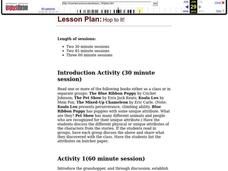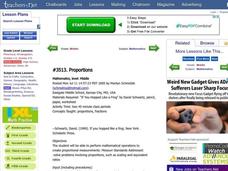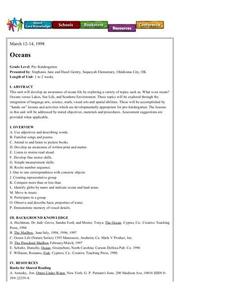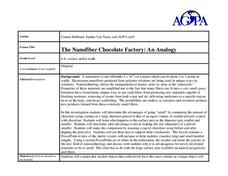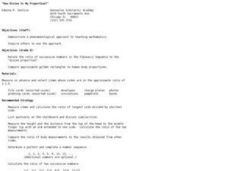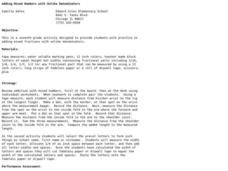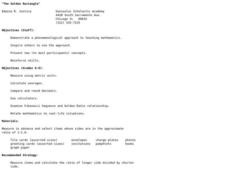Curated OER
What's Your Angle?
Third graders read the story, Magic Schoolbus Inside the Human Body. Then they form right, acute, and obtuse angles using the joints inside their bodies. They write a brief summary about what they learned about angles as a review the...
Curated OER
Building A Bug Bungalow
Students chart how milkweed bugs grow and change. In this growth and life stages activity, students read two stories and discuss how and why things grow. Students brainstorm what can be measured about humans, review and...
Curated OER
Hop To It!
Young scholars explore grasshoppers. In this grasshoppers lesson, students measure the jumping distance of live grasshoppers. Young scholars then record the jumping distance of people in their group. Students record the...
Curated OER
Gravity: It's GREEEAAATTT!
Students calculate effects of gravitational force on planets, discuss the effects of weightlessness on the human body and describe and demonstrate how objects in a state of free fall are accelerated by gravity at an equal rate.
Curated OER
Proportions
Middle schoolers perform mathematical operations to create proportional measurements, after listening to the David Schwartz book, If You Hopped Like a Frog.
Curated OER
Oceans
Students become aware of the differences between ocean water and lake water by smelling, tasting and seeing. They distinguish between land and bodies of water on a globe and gain increased awareness of oceans and life.
Curated OER
Shapes (Geometric)
Second graders explore geometric shapes. In this lesson about geometry, 2nd graders create their own vest using geometric shapes. Students work with a partner and fit their partner for the vest they design. Students understand geometric...
Curated OER
The Nanofiber Chocolate Factory: An Analogy
Students investigate Nanotechnology. In this physic's lesson, students evaluate a hands-on model made from chocolate syrup and pretzels to determine the advantages of size. Students weigh chocolate syrup to determine it's wait...
Curated OER
How tall are you?
Students review different units of measurement that would be used to measure height. They compare their height to that of Abraham Lincoln by working with a partner to make a life size tracing of each other and measuring their height.
Curated OER
The Heart Stopper
Use the pump from a spray bottle to drive a model of the heart in action! In addition to modeling the function of the heart and blood vessels, aspiring anatomists also simulate arterial blockage. They compare the effects of increased...
Scholastic
Discussion and Dissection of an Owl Pellet
Young scientists get the chance to dissect pellets "owl" by themselves to determine the owls environment and nourishment. This is the third part of a three-part series.
Virginia Department of Education
Heat and Thermal Energy Transfer
How does radiation affect our daily lives? Answer that question and others with a lesson that discusses radiation and its use in thermal energy transfer through electromagnetic waves. Pupils investigate vaporization and...
Curated OER
International System of Units: Metric System
Students listen to lecture on metric system, make vocabulary book containing at least fifteen related terms, measure length, mass, and volume using appropriate metric units, and measure temperature using Celsius scale.
Curated OER
"How Divine Is My Proportion?"
Eighth graders explore the concept of the divine proportion/golden ratio. In this Fibonacci Sequence exploratory lesson, 8th graders measure the length and width of various objects to see which items have a divine proportion. Students...
Curated OER
Adding Mixed Numbers with Unlike Denominators
Seventh graders practice measuring skills as they add mixed fractions. In this fractions lesson plan, 7th graders measure the distance from their wrist to the tip of their finger, record the measurement, and repeat this procedure with...
Curated OER
The Golden Rectangle
Students explore the concept of the golden ratio. In this golden ratio lesson, students measure objects to determine if their measurements fit the golden ratio. Students calculate the average measurements of the class.
Curated OER
Introduction to Fractions Using Cuisenaire Rods
Fifth graders use Cuisenaire rods in order to discover how to represent fractions with real objects. For this lesson on fractions, 5th graders first examine and learn the colors, lengths, and numerical values of each rod; then, students...
Curated OER
Leonardo da Vinci
Students select appropriate tools and technology to perform tests, collect data, and display data. They construct appropriate graphs from data and develop qualitative statements about the relationships between variables.
Curated OER
Jumping Frogs
Students create a jumping frog out of construction paper, close pins and pipe cleaners. They predict how far they think their frog jump and then test it out to see how close or far away they were from their prediction.
Curated OER
Springy Legs
Fifth graders measure their body height and the height they can jump. They use these measurements in forms of ratios, fractions and decimals to describe their Springy Legs Factors (SLF). Students compare their SLFs to other people's...
Curated OER
PLANETS IN PROPORTION
Students discover scales for both the solar bodies' relative sizes and their distances from the sun. They find equatorial circumference and volumes of their solar bodies. Students apply estimation strategies and proportioanl reasoning to...
Curated OER
Is There A Formula for People?
Students explore proportions which are typical of the human body. Given a list of classic proportions from earlier centuries, students work in pairs to test the validity of the proportions. Pupils share their personal measurements. ...
Curated OER
Trigonometric Ratios
Young scholars measure and analyze angles. In this trigonometry instructional activity, students measure angles and distances use non-traditional techniques. They identify the different ratios of sine, cosine and tangent.
Curated OER
Metric Conversions
Students translate a mathematical idea from one form to another. They compare and convert a given measurement to another unit within the same measurement system.


